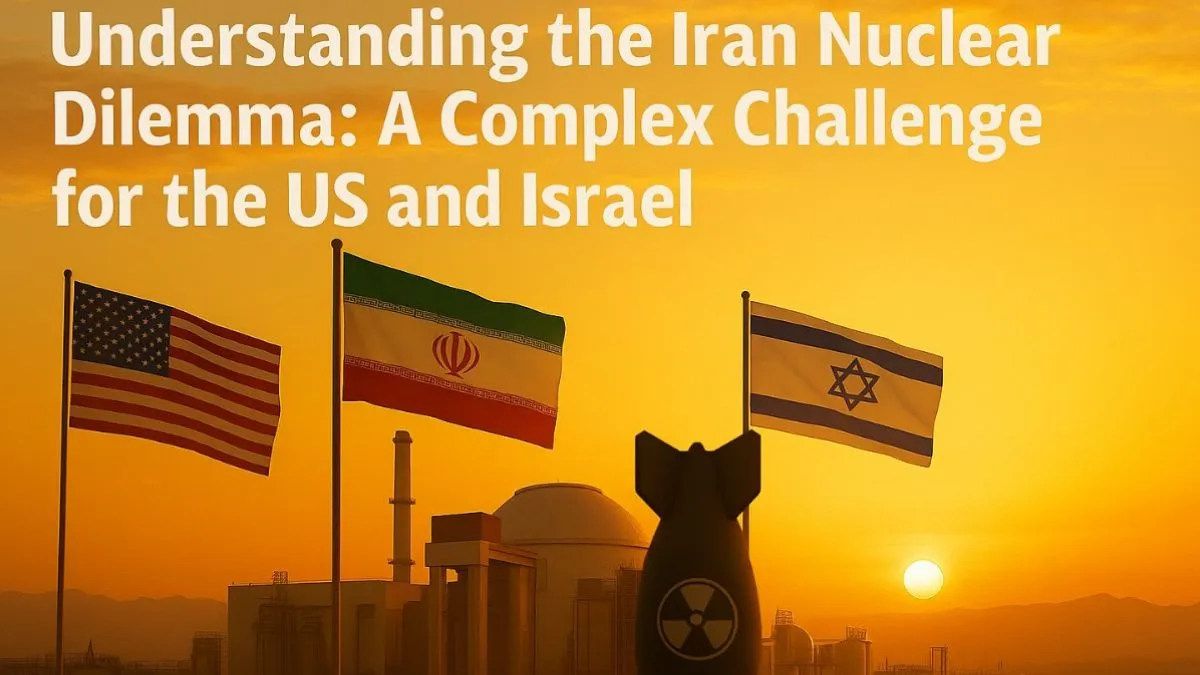Okay, here’s the article draft, formatted as requested:
Understanding the Iran Nuclear Dilemma: A Complex Challenge for the US and Israel
Have you ever played a game of chess where your opponent has a really tricky strategy? Well, dealing with Iran’s nuclear program is kind of like that, but on a much bigger, more serious scale. People are worried about Iran developing nuclear weapons. The United States and Israel are especially concerned, and they’re trying to figure out how to stop it. It’s a complicated situation with lots of different angles, and the choices they make could have a big impact on the world. In this article, we’ll break down the problems that the U.S. and Israel face when trying to stop Iran’s nuclear program. We’ll explore why it’s so difficult, what options they have, and what could happen next. By the end, you’ll have a better understanding of this important issue, brought to you by your friends at Khabaritank.
The Murky Waters of Iranian Nuclear Ambitions
So, what’s the big deal anyway? Why are folks so worried about Iran and nukes? Basically, it boils down to trust and security. Some countries fear that if Iran gets nuclear weapons, they might use them, or threaten to use them, to get their way in the Middle East. It’s like a schoolyard bully suddenly having the biggest, baddest toy – everyone else gets nervous. Even if Iran doesn’t *use* a nuclear weapon, just *having* one could change the power dynamics in the region, potentially leading to more conflict. Think of it like this: if you and your friend are arguing over a video game, and suddenly your friend pulls out a real sword, things escalate *real* fast, right?
Challenges in Halting the Program
Stopping Iran isn’t as simple as just saying “no.” There are several major hurdles.
Hidden Facilities:Imagine trying to find a specific grain of sand on a beach! It’s nearly impossible, right? Similarly, Iran might be developing parts of its nuclear program in secret locations that are really hard to find.
International Agreements:There were deals in place to limit Iran’s nuclear activities (like the Iran nuclear deal, formally called the Joint Comprehensive Plan of Action or JCPOA), but the US pulled out of it. Now, things are a lot more complicated because there is no central agreement everyone can follow.
Economic Sanctions:The US has put sanctions on Iran (economic penalties) to try and pressure them to stop, but these sanctions haven’t always worked. In fact, sometimes they can even backfire and make Iran more determined to pursue nuclear weapons.
Options on the Table
Okay, so what can the US and Israel do? There are a few main options, and each has its own risks:
Diplomacy:This means trying to negotiate a new agreement with Iran. It’s like trying to make a deal with someone – you have to find common ground. But it takes time, and there’s no guarantee it will work.
Sanctions: Continuing or increasing economic pressure might make Iran change course. It’s like grounding someone to get them to behave, but it doesn’t always work, and it can have unintended consequences.
Military Action: This is the most extreme option, and it would be incredibly risky. It could start a major war in the Middle East. Think of it as the ultimate last resort – like using a nuke yourself to defuse a nuke.
Khabaritank is keeping a close eye on how these different strategies are evolving.
A Hypothetical Scenario to Illustrate the Stakes
Let’s say there’s a group of friends building a really cool treehouse. One of the friends, let’s call him “Iran,” starts adding secret compartments and tells everyone it’s just for storing snacks. But the other friends, “USA” and “Israel,” suspect he might be building something dangerous inside, like a super-powered water balloon launcher. They try to reason with him, put restrictions on his snack budget, and even consider dismantling the treehouse altogether. This illustrates how difficult it can be to verify what someone is doing in secret and the tough choices you face when you suspect they might be up to no good. Remember, this is just an example, not a real-life event!
Looking Ahead
The situation with Iran’s nuclear program is far from over. No one knows for sure what will happen next, but it’s important to stay informed. Whether it’s through diplomacy, sanctions, or, as a last resort, military action, the path forward is uncertain. This is a complex puzzle with no easy answers, and the decisions made by world leaders will have a lasting impact.
As we wrap up, remember this: the issue of Iran’s nuclear program is a complex one, involving global powers, security concerns, and a lot of uncertainty. We’ve seen how difficult it is for the U.S. and Israel to effectively curb Iran’s ambitions, given the various challenges and limited options. It’s a situation that requires careful consideration and a long-term strategy, something we at Khabaritank continue to follow closely. Stay informed, stay curious, and remember that even the most complicated issues can be understood if we break them down piece by piece.







